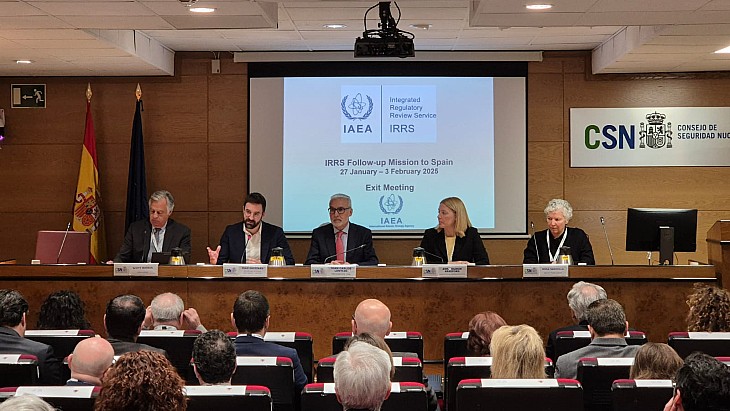Integrated Regulatory Review Service (IRRS) missions are conducted at the request of IAEA member states to review and suggest enhancements to the regulatory infrastructure for nuclear, radiation, radioactive waste and transport safety. The follow-up mission to Spain had four regulatory experts from France, Germany, Switzerland and the USA, as well as four IAEA staff members.
They concluded that 12 recommendations and 20 suggestions made during the original mission had been adequately addressed. Scott Morris, Regional Administrator for the US Nuclear Regulatory Commission and Team Leader for the mission, said: "The IRRS team was very impressed with the high degree of commitment and professionalism demonstrated by our Spanish counterparts. Their focus on continuous improvement of the legal and regulatory framework for nuclear and radiological safety in Spain is commendable."
Achievements highlighted by the mission include: developing a human resource plan, including a systematic training approach for all staff; strengthening the safety culture of the Nuclear Safety Council (CSN); establishment of a national radon action plan, and ensuring CSN’s effective collaboration with the Autonomous Communities of Spain.
They also highlighted two areas of good practice - the creation of a digital platform to provide users with real-time dose data, and also a centralised digital dosimetry system to be used during emergencies for real-time radiation dose monitoring of emergency workers of all off-site response organisations.
CSN President Juan Carlos Lentijo said: "The IRRS follow-up mission reinforces Spain's commitment to nuclear safety and radiation protection. This process is a valuable tool to work on robust and future-proof safety systems, where excellence continues to be the highest priority."
Spain has seven operating nuclear power reactors producing about 20% of its electricity. It also has three plants in permanent shutdown, most reactor sites have interim used fuel storage facilities and the country has one disposal facility for very low- to intermediate-level radioactive waste. Spain had its first IRRS mission in 2008, with a follow-up mission in 2011, and in 2018 it hosted the IAEA's first combined IRRS-ARTEMIS (Integrated Review Service for Radioactive Waste and Spent Fuel Management, Decommissioning and Remediation) mission.
A follow-up ARTEMIS mission will take place later this year. The final report from the eight-day IRRS mission, which took place from 26 January, will be sent to the Spanish government in about three months.















